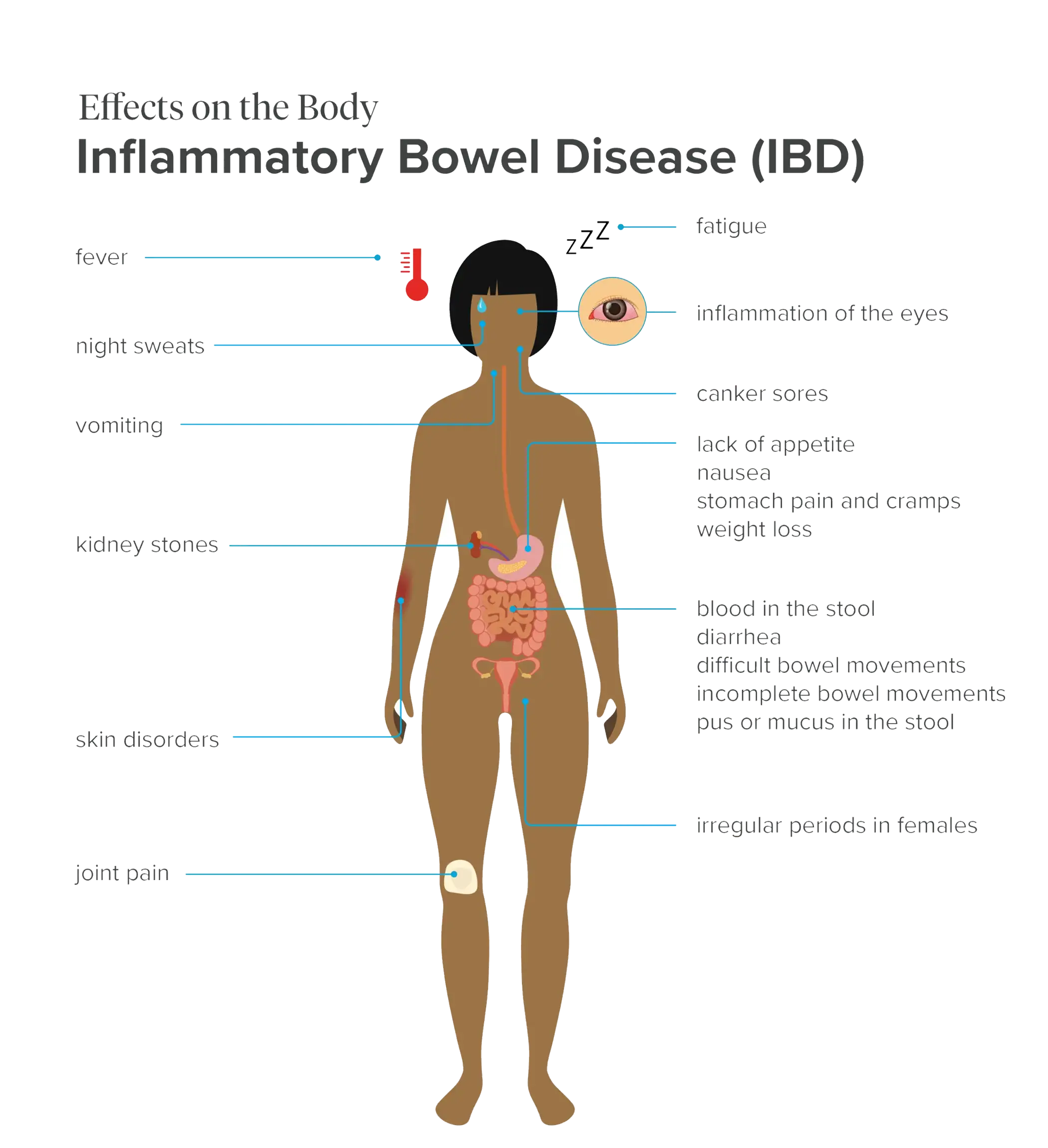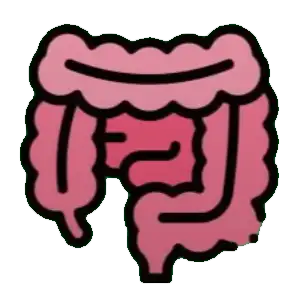FREEDOM FROM CROHN’S DISEASE
The World’s Best Treatment Program
Crohn’s disease is a relatively common inflammatory bowel disease (IBD), affecting millions of people worldwide. In the United States, it’s estimated that approximately 1.6 million Americans have been diagnosed with Crohn’s disease.
Crohn’s disease can have a significant impact on an individual’s quality of life, leading to symptoms such as abdominal pain, diarrhea, fatigue, weight loss, and reduced social functioning. Many individuals with Crohn’s disease also experience psychological distress, including anxiety and depression, which can further affect their well-being.
What is Crohn’s Disease (IBD)?
Crohn’s disease is a chronic inflammatory bowel disease (IBD) characterized by inflammation of the gastrointestinal tract. This condition can affect any part of the digestive system, from the mouth to the anus, but it most commonly occurs in the small intestine and the beginning of the large intestine (colon). Crohn’s disease is characterized by periods of active inflammation, known as flare-ups, followed by periods of remission, during which symptoms may improve or disappear entirely.
The exact cause of Crohn’s disease is not fully understood, but it is believed to involve a combination of genetic, environmental, and immune system factors. Genetics play a significant role, as individuals with a family history of Crohn’s disease are at increased risk of developing the condition. Environmental factors, such as diet, smoking, and exposure to certain infections, may also contribute to the development of Crohn’s disease. Additionally, abnormalities in the immune system, including an overactive immune response to gut bacteria, are thought to play a role in triggering inflammation in the digestive tract.
Complications of Crohn’s disease may include intestinal strictures (narrowing of the intestine), fistulas, abscesses, malnutrition, and bowel obstruction. In severe cases, Crohn’s disease may require surgery to remove damaged portions of the intestine or to repair complications.
While there is no cure for Crohn’s disease, treatment aims to control inflammation, manage symptoms, and prevent complications. Treatment may include medications such as anti-inflammatory drugs, immunomodulators, biologic therapies, antibiotics, and corticosteroids. In some cases, surgery may be necessary to remove diseased portions of the intestine or to repair complications.
Crohn’s Disease (IBD) Symptoms
Do you suspect or know that you have Crohn’s Disease (IBD)? You may experience symptoms such as these:
- Persistent Diarrhea.
- Abdominal Pain and Cramping.
- Fatigue.
- Weight Loss.
- Rectal Bleeding.
- Fever.
- Abdominal Swelling and Bloating.
- Nausea and Vomiting.
- Reduced Appetite.
- Joint Pain.
- Skin Problems.
- Eye Problems
- Mouth Ulcers

Traditional Treatments for Crohn’s Disease (IBD)
While there is currently no cure for Crohn’s disease, several traditional treatment approaches aim to manage symptoms and improve quality of life for individuals affected by this chronic inflammatory bowel condition. These treatments focus on reducing inflammation, controlling symptoms, and preventing complications associated with the disease. Here are some common traditional treatments for Crohn’s disease:
Anti-Inflammatory Medications
Aminosalicylates (5-ASAs): These medications help reduce inflammation in the intestines and are commonly used to treat mild to moderate Crohn’s disease, particularly in the colon.
Corticosteroids
Prednisone, prednisolone, and budesonide are corticosteroids that can help reduce inflammation and alleviate symptoms during flare-ups of Crohn’s disease. They are typically used for short-term treatment due to the risk of long-term side effects.
Immunomodulators
Thiopurines (azathioprine and mercaptopurine) and methotrexate are immunomodulatory medications that work by suppressing the immune system’s abnormal response in Crohn’s disease. They are used to induce and maintain remission in moderate to severe cases.
Biologic Therapies
Anti-tumor necrosis factor (TNF) agents, such as infliximab, adalimumab, and certolizumab pegol, are biologic medications that target specific proteins involved in the inflammatory process. They are used to treat moderate to severe Crohn’s disease that has not responded to other treatments. Other biologics, such as vedolizumab and ustekinumab, target different pathways in the immune system and may be used in individuals who do not respond to anti-TNF therapy.
Antibiotics
Antibiotics such as metronidazole and ciprofloxacin may be prescribed to treat bacterial overgrowth, abscesses, or fistulas in individuals with Crohn’s disease. They can also help reduce inflammation in the intestines.
Symptom Management
Antidiarrheal medications, such as loperamide (Imodium), may be used to control diarrhea and reduce bowel movements. Pain relievers, such as acetaminophen, may help alleviate abdominal pain associated with Crohn’s disease. However, nonsteroidal anti-inflammatory drugs (NSAIDs) should be avoided due to their potential to worsen symptoms. Iron supplements may be prescribed to treat anemia resulting from chronic blood loss or malabsorption in Crohn’s disease.
Finding the Root Cause
Crohn’s disease is a multifactorial condition with complex origins, often necessitating comprehensive exploration to pinpoint underlying factors contributing to its onset. While the precise etiology of Crohn’s disease remains elusive, several potential contributors have been implicated in its development.
- Genetic Predisposition: There is strong evidence suggesting a genetic component to Crohn’s disease, with certain genetic variations increasing susceptibility to the condition. Individuals with a family history of Crohn’s disease are at a higher risk of developing the condition themselves.
- Dysregulated Immune Response: Dysfunction of the immune system is believed to be a key factor in the development of Crohn’s disease. Abnormalities in immune function, including inappropriate responses to gut microbiota and chronic inflammation, contribute to intestinal damage and inflammation characteristic of the disease.
- Environmental Triggers: Environmental factors may play a role in triggering or exacerbating Crohn’s disease in susceptible individuals. Factors such as diet, smoking, antibiotic use, and exposure to certain infections or pollutants have been implicated as potential triggers for disease onset or flares.
- Lifestyle Factors: Lifestyle choices, including diet, stress, and smoking, can influence the risk of developing Crohn’s disease and may impact disease severity and progression. Adopting a healthy lifestyle, including a balanced diet, regular exercise, stress management, and smoking cessation, may help reduce the risk of Crohn’s disease and improve outcomes for individuals living with the condition.
Hundreds experience freedom from Crohn’s Disease with Dr. Walter Campbell
98%
love their experience
Joy Callaghan

CROHN’S DISEASE

My symptoms that have improved are: Every single one!!!!
Patricia Mohar

CROHN’S DISEASE

My son has his energy back and feeling very good.
Larry Jones

CHRON’S DISEASE

The healing process in going very,very well. This is real good stuff
Cherry Chelsea

CROHN’S DISEASE

My overall condition has improved: 100 percent!!
Start Your Health Consultation
We’ve set up a comprehensive new patient special that includes everything necessary to determine the root cause of your condition and start you on the journey to getting your life back.
Optimal wellness is just a click away.
